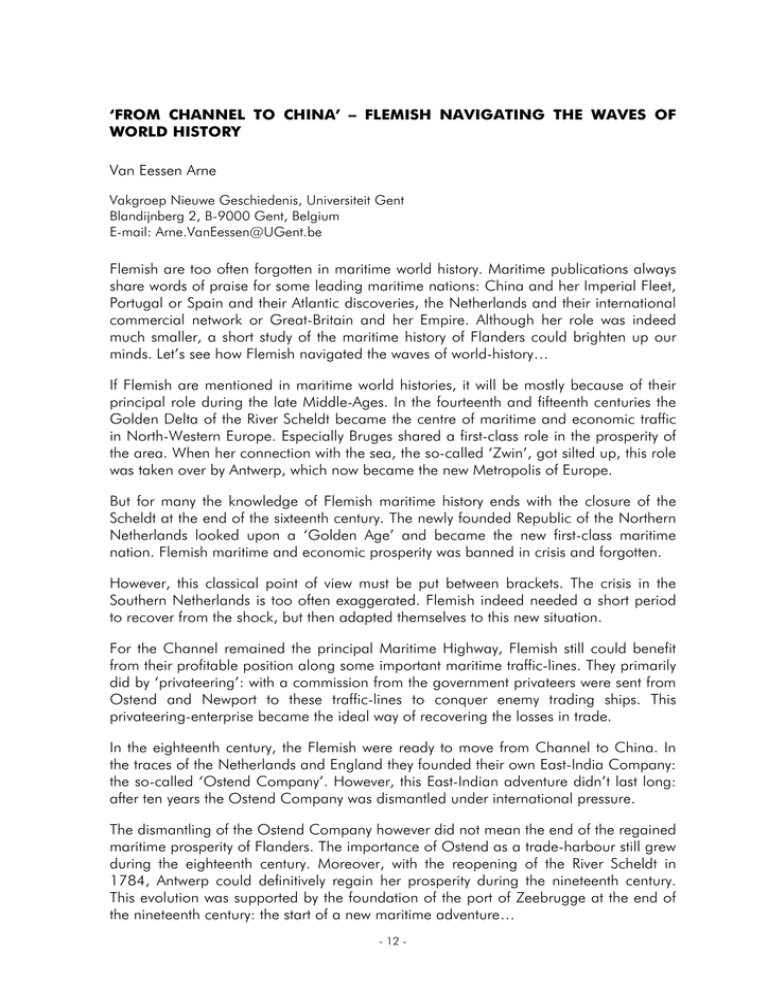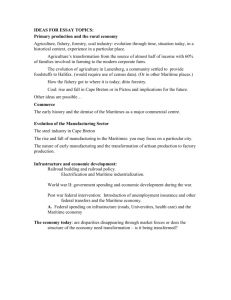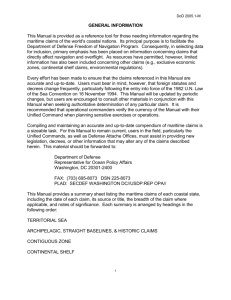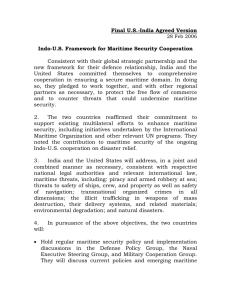Van Eessen Arne WORLD HISTORY
advertisement

‘FROM CHANNEL TO CHINA’ – FLEMISH NAVIGATING THE WAVES OF WORLD HISTORY Van Eessen Arne Vakgroep Nieuwe Geschiedenis, Universiteit Gent Blandijnberg 2, B-9000 Gent, Belgium E-mail: Arne.VanEessen@UGent.be Flemish are too often forgotten in maritime world history. Maritime publications always share words of praise for some leading maritime nations: China and her Imperial Fleet, Portugal or Spain and their Atlantic discoveries, the Netherlands and their international commercial network or Great-Britain and her Empire. Although her role was indeed much smaller, a short study of the maritime history of Flanders could brighten up our minds. Let’s see how Flemish navigated the waves of world-history… If Flemish are mentioned in maritime world histories, it will be mostly because of their principal role during the late Middle-Ages. In the fourteenth and fifteenth centuries the Golden Delta of the River Scheldt became the centre of maritime and economic traffic in North-Western Europe. Especially Bruges shared a first-class role in the prosperity of the area. When her connection with the sea, the so-called ‘Zwin’, got silted up, this role was taken over by Antwerp, which now became the new Metropolis of Europe. But for many the knowledge of Flemish maritime history ends with the closure of the Scheldt at the end of the sixteenth century. The newly founded Republic of the Northern Netherlands looked upon a ‘Golden Age’ and became the new first-class maritime nation. Flemish maritime and economic prosperity was banned in crisis and forgotten. However, this classical point of view must be put between brackets. The crisis in the Southern Netherlands is too often exaggerated. Flemish indeed needed a short period to recover from the shock, but then adapted themselves to this new situation. For the Channel remained the principal Maritime Highway, Flemish still could benefit from their profitable position along some important maritime traffic-lines. They primarily did by ‘privateering’: with a commission from the government privateers were sent from Ostend and Newport to these traffic-lines to conquer enemy trading ships. This privateering-enterprise became the ideal way of recovering the losses in trade. In the eighteenth century, the Flemish were ready to move from Channel to China. In the traces of the Netherlands and England they founded their own East-India Company: the so-called ‘Ostend Company’. However, this East-Indian adventure didn’t last long: after ten years the Ostend Company was dismantled under international pressure. The dismantling of the Ostend Company however did not mean the end of the regained maritime prosperity of Flanders. The importance of Ostend as a trade-harbour still grew during the eighteenth century. Moreover, with the reopening of the River Scheldt in 1784, Antwerp could definitively regain her prosperity during the nineteenth century. This evolution was supported by the foundation of the port of Zeebrugge at the end of the nineteenth century: the start of a new maritime adventure… - 12 -




